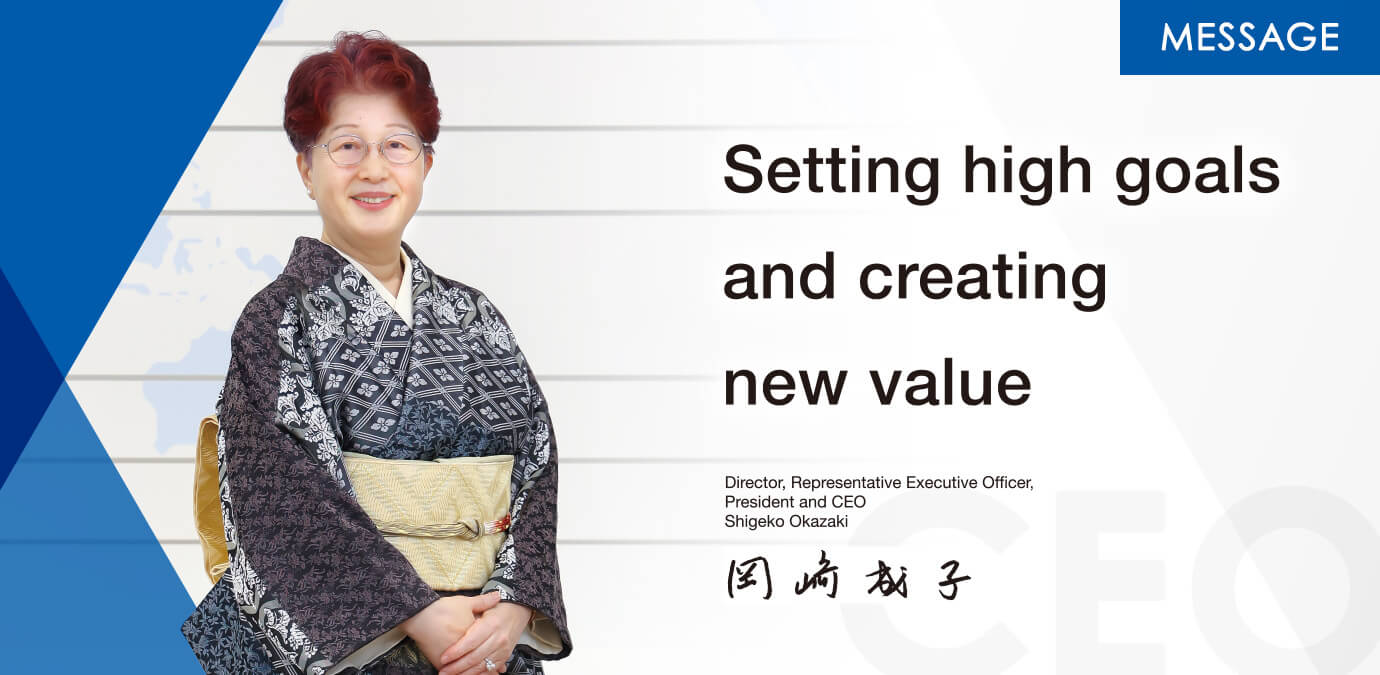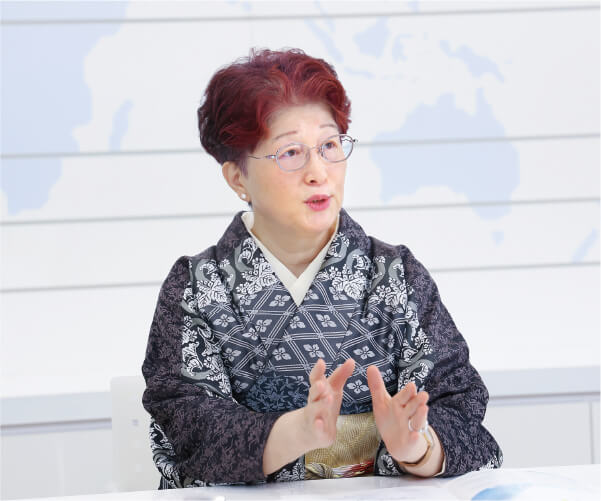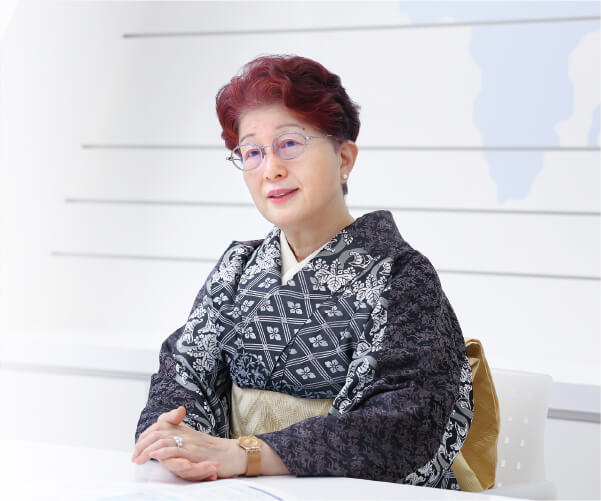President and CEO Message

The new management plan "FSG.30," a catalyst for increased revenue and profits in FY2024
Our Business performance in FY2024 was favorable, in particular our operating income increasing significantly. A major factor behind this was the new management plan "FSG.30,"* which aims to achieve net sales of 350 billion yen and a double-digit operating profit margin by 2030. Although investors often ask to see a three-year plan, we have learned from past medium-term management plans that this can limit our view to an extension of the current businesses and are unable to take on bold challenges. This time, by setting the goals a little further to 2030, we created a shift in mindset in each region - Japan, the Americas, Europe, and ASEAN - where we now see this as a passing phase and that there is more that they can do to achieve our goals. I believe that this is what has led to our results.
Another contributing factor is that a matrix management has been established. Previously, decisions were made by the president of each region, who were familiar with the local market. Currently, executive officers from each business are also involved, frequently exchanging information and working together to solve problems. At the Board of Directors and Executive Officer meetings, reports from both sides are presented simultaneously, enabling management to make faster and more accurate decisions based on a multifaceted perspective.
In Japan, the organizational changes made in 2023 that saw the Company move to a business division system have proven successful. By having each business division handle everything from development to sales, we were able to increase the speed of each process. Furthermore, each employee began to act with a greater sense of responsibility and initiative, and their awareness of profits also increased. In that sense, I feel that the shift to a business division system was a turning point in the way our organization is structured and the way individuals work.
*FSG.30: Fuji Seal Sustainable Growth 2030 Strategy
High targets demonstrate commitment to creating new businesses and expectations for new value created by the next generation
The Fuji Seal Group was founded in 1897 as a manufacturer of wooden products. As containers changed from wooden barrels to glass bottles, cans, and plastic containers, we were the first in the world to develop shrink sleeve labels in the 1950s. We then changed our business model to become a packaging manufacturer and have been quick to respond to changes in logistics.
We will continue to firmly protect our shrink sleeve labels business, which has established the foundation of our current business. If we continue to grow our four existing businesses of shrink sleeve labels, pressure sensitive labels, spouted pouches, and machinery, we expect to achieve sales of 300 billion yen by 2030. However, the target set in FSG.30 is 350 billion yen. The decision to add 50 billion yen is extremely important, as it demonstrates our strong determination to create new core businesses.
However, 350 billion yen may just a milestone, and we may aim for 1 trillion yen in the future. Perhaps we will see the creation of new value that goes beyond scale and technology alone. I am excited to see what the next generation will think and do.
Responding to customers who continue to create attractive products with our development and system capabilities
The Fuji Seal Group has three strengths: "valued customers," "global presence," and "production." In my opinion, "valued customers" are those who are serious about growth. To grow, they need sales and profits. By creating products that consumers want, sales will increase, and if the product is attractive, it can be sold at a fair price, generating profits. They use those profits to create new products and use feedback to create even better products. By doing business with customers who are able to sense changes in the world and act quickly and appropriately to produce results, we are able to grow together with them. One recent market trend is the expansion of private label products produced by retail and logistics companies. We are holding repeated discussions across business and regional boundaries to consider how we can address new customer needs.
When it comes to "global presence," we are sometimes asked who our competitors are. There are companies overseas that operate a similar businesses to ours, in that they are globally positioned and provide packaging that customers want through local production and local consumption. However, the big difference is that we develop our products in-house. When a customer requests to use a new label or packaging, we have label applicators to make it possible, and we can also provide systems that ensure productivity and profits in the customer's factory. I believe that many of our customers appreciate these strengths.
Expanding our business areas thanks to excellent business partners and finding value in our verification capabilities
An essential factor in establishing this global presence is to have excellent business partners. Currently, the majority of our Japan business is in the beverage sector, while overseas we are expanding into the dairy, food, home personal care, and medical sectors. This is because our global business partners listen to various customer requests and believe they can develop these products together with the Fuji Seal Group.
Recently, we have been having a lot of conversations within the Company about how our business partners help us and ask, "What exactly is the value of our existence?" I believe it lies partly in our verification capabilities.As we conduct business in the four regions of Japan, the Americas, Europe, and ASEAN, rather than just sticking to one solution, we repeatedly verify different solutions with local customers and suppliers. We try to bring a solution that scored 30 points closer to 100. I believe that this ability to persevere and never give up is what gives value to our existence.
Strengthening existing businesses to keep up with the changing times and offering products that will become new options for customers

With regard to "steadily strengthening the four existing businesses" as stated in the growth strategy, we will work to improve production efficiency, review our portfolio, and expand sales of recyclable shrink sleeve labels (RecShrink) and water-based flat labels.
Flat labels are commonly referred to as "wrap-around labels" and first appeared about 10 years ago. We thoroughly examined safety and display area requirements and developed ultra-thin shrink sleeve labels that significantly reduced the amount of plastic used, putting an end to this trend. However, now receiving requests for flat labels again. This is simply a change in the market. Although there are still issues to be addressed with regards to production efficiency, we would like to develop flat labels into an option for products that will make a strong impression in the market.
Our approach on valuable products that have issues in terms of competitiveness and profit margins is to temporarily put them in a "performance review box" and then consider whether to discontinue them, or take measures to retain them. We are sometimes asked: "Have you gone through the entire process of deciding which products to keep or discontinue? Has the product cycle come full circle?" However, as times change, some products can quickly become outdated, while others may be reborn as new Fuji Seal technology that we can be proud of. In that sense, there is no end to this approach.
Conducting an engagement survey in each region and taking each individual's thoughts seriously
A new human capital initiative we have introduced is the implementation of an engagement survey. We plan to conduct this survey in Japan using a globally standardized questionnaire. We have already conducted the survey in the Americas, Europe, and ASEAN, and have begun to collect basic data on how employees view the company. Given that there is such thing as cultural differences, there is no point in comparing employees of one country side by side with those of another. It is important for each person in charge to take the thoughts of employees seriously, discuss what is needed, and take appropriate measures, and I believe we have been able to lay the foundation for this.
We continue to implement the Executive Leadership Program, developed in collaboration with a Belgian business school. Participants of the program have gained a high-level perspective, and I feel they have grown. We also continue to hold Value Seminars aimed at sharing the Fuji Seal Group's values. Although these activities may be modest, I believe that these consistent efforts will enable us to achieve sustainable growth.
"Providing opportunities" rather than just nurturing successors and reaffirming what we should do based on external feedback
Regarding governance, we recognize that even if we think we are doing well, there are times when we fall short, and this will inevitably manifest itself in the form of risk. Based on this awareness, we have implemented several measures, including appointing an executive officer responsible for both legal affairs and risk management, translating our Code of Ethics into multiple languages, and introducing a Consultation Hotline (whistleblowing system) for the entire Group. As the theme of this fiscal year's group compliance is "Bad news first," we strive to report and respond to bad news as quickly as possible. The Family Festival is another important initiative. We introduce the words written on Compliance Cards so that family members can get a clear picture of what the Fuji Seal Group stands for. Although we were forced to suspend the event due to the COVID-19 pandemic, we were able to resume holding it again since last year.
It is the responsibility of directors and executive officers to develop plans to train successors who will take over as the next generation of management. During a discussion on how to train successors, one of our outside directors said: "It would be presumptuous to think that we could train someone to be a successor. If we did train someone, they would never be better than us." I realized how true that was. When people are placed in positions of responsibility, they naturally grow. I realized that my role is not to train them, but to provide them with opportunities. Thus, I believe that governance starts with listening to the voices of people outside the company, and using that feedback to strengthen the company.
Promoting horizontal recycling initiatives to realize a sustainable society

Under our vision of "Our Value to People and the Planet," we aim to become a company committed to "Our proactive impact to realize the Regenerative Society." We must leave a better environment for future generations.
Therefore, we are focusing on horizontal recycling. One of the main initiatives is "Label-to-Label", in which the printed designs from used labels are removed making them recyclable as new labels. With an increase in customer awareness, we are making steady progress together with our business partners towards realizing horizontal recycling. However, there are still many issues that need to be solved. For example, although PET bottles from households are collected and sorted, what is done with other materials? In Germany and the Netherlands, a system has been introduced in which a deposit for certain containers is added to the purchase of a product, this deposit is refunded when the container is returned. However, in Japan, it is difficult to say whether consumers will choose products that have an added charge. I feel that the next big hurdle we need to overcome is creating the necessary social systems after establishing a technology.
Regarding the "Label-to-Bottle" initiative, which recycles used PET bottles with labels into new PET bottles, RecShrink labels, and certified by the U.S.-based Association of Plastic Recyclers, are increasingly being adopted, contributing to the acceleration of horizontal recycling in the Americas.
The key to the success of FSG.30 is for each individual to take personal interest in it
In a recent employee engagement survey, we saw comments that "it is difficult to understand the Company's direction." To prevent this from happening, we have created various tools such as supplementary financial statements and integrated reports, and we have been quite open about sharing information, including our way of thinking, so I was quite shocked by this. We need to consider how to ensure that the information we communicate is effectively received. Additionally, it is crucial to encourage employees not only to read the information but also to internalize it as something that directly concerns them. I believe that this is the key to making FSG.30 a success.
Although the pace of progress may vary between now and 2030, we will continue to work hard to achieve our goals.
We look forward to sharing our continued growth.
